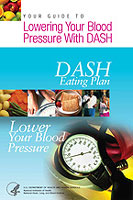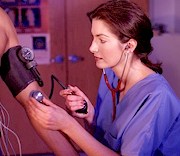Related terms: HBP, HTN, primary hypertension, essential hypertension
Hypertension, the medical term for high blood pressure, is known as "the silent killer." More than 80 million Americans (33%) have high blood pressure, and as many as 16 million of them do not even know they have the condition. If left untreated, high blood pressure greatly increases your risk for heart attack and stroke. Hypertension is projected to increase about 8 percent between 2013 and 2030.
Your heart pumps blood through a network of arteries, veins, and capillaries. The moving blood pushes against the arterial walls, and this force is measured as blood pressure.
High blood pressure results from the tightening of very small arteries called arterioles. Arterioles regulate the blood flow through your body. As these arterioles tighten (or constrict), your heart has to work harder to pump blood through the smaller space, and the pressure inside the vessels grows.
High blood pressure can affect your health in four main ways:
- Hardening of the arteries. Pressure inside your arteries can cause the muscles that line the walls of the arteries to thicken, thus narrowing the passage. A heart attack or stroke can occur if a blood clot blocks blood flow to your heart or brain.
- Enlarged heart. High blood pressure increases the amount of work for your heart. Like any heavily exercised muscle in your body, your heart grows bigger (enlarges) to handle the extra workload. The bigger your heart is, the more it demands oxygen-rich blood but the less able it is to maintain proper blood flow. As a result, you feel weak and tired and are not able to exercise or perform physical activities. Without treatment, your heart failure will only get worse.
- Kidney damage. Prolonged high blood pressure can damage your kidneys if their blood supply is affected.
- Eye damage. If you have diabetes, high blood pressure can cause the tiny capillaries in the retina of your eye to bleed. This condition, called retinopathy, can lead to blindness.
What causes high blood pressure?
About 90% to 95% of all high blood pressure cases are what is called primary, or essential hypertension. That means the real cause of the high blood pressure is not known, but a number of factors contribute. You are at increased risk if you -
- Have a family history of high blood pressure.
- Are African American. African Americans develop high blood pressure more often than whites, and it tends to happen earlier in life and be more severe.
- Are a man, but women are at an increased risk after age 55.
- Are older than 60. Blood vessels become more brittle with age and are not as flexible.
- Face high levels of stress. In some studies, stress, anger, hostility, and other personality traits have been shown to lead to high blood pressure.
- Are overweight or obese.
- Use tobacco products. Smoking damages your blood vessels.
- Use oral contraceptives. Women who smoke and use oral contraceptives greatly increase their risk.
- Eat a diet high in saturated fat.
- Eat a diet high in salt (sodium).
- Drink more than a moderate amount of alcohol. Experts say that moderate intake is an average of one to two drinks per day for men and one drink per day for women. One drink is defined as 1½ fluid ounces (fl oz) of 80-proof spirits, 1 fl oz of 100-proof spirits, 4 fl oz of wine, or 12 fl oz of beer.
- Are physically inactive.
- Have diabetes.
Researchers have also found a gene that appears to be linked to high blood pressure. If you have the gene, you are more likely to develop high blood pressure, so you should monitor your blood pressure and eliminate as many of the other risk factors as you can.
The remaining patients with high blood pressure have what is called secondary hypertension which means the high blood pressure is the result of another condition or illness. Many cases of secondary hypertension are caused by kidney disorders. Other conditions that can cause secondary hypertension are
- Problems with the parathyroid gland.
- Acromegaly, which is a condition where the pituitary gland makes too much growth hormone.
- Tumors in the adrenal or pituitary glands.
- Reactions to medicines for other medical problems.
- Pregnancy.
What are the symptoms of high blood pressure?
Most people who have high blood pressure do not have symptoms. In some cases, people with high blood pressure may have a pounding feeling in their head or chest, a feeling of lightheadedness or dizziness, or other signs. Without symptoms, people with high blood pressure may go years without knowing they have the condition.
How is high blood pressure diagnosed?
A visit to your doctor is the only way to find out if you have high blood pressure. You should have a general medical check-up that includes a review of your family's medical history. Your doctor will take several blood pressure readings using a device called a sphygmomanometer and run a few routine tests.
Your doctor may also use a device called an ophthalmoscope to look at the blood vessels in your eyes. Doctors can see if these vessels have thickened, narrowed, or burst, which may be a sign of high blood pressure. Your doctor will also use a stethoscope to listen to your heart and the sound of blood flowing through your arteries. In some cases, a chest x-ray and electrocardiogram may be needed.
Blood pressure readings
Blood pressure readings measure the two parts of blood pressure: systolic and diastolic pressures. Systolic pressure is the force of blood flow through an artery when the heart beats. Diastolic pressure is the force of blood flow within blood vessels when the heart rests between beats.
A blood pressure reading measures both the systolic and diastolic forces, with the systolic pressure listed first. The numbers show your pressure in units of millimeters of mercury (mm Hg)—how high the pressure inside your arteries would be able to raise a column of mercury. For example, a reading of 120/80 mm Hg means a systolic pressure of 120 mm Hg and diastolic pressure of 80 mm Hg.
Most doctors do not make a final diagnosis of high blood pressure until they measure your blood pressure several times (at least 2 blood pressure readings on 3 different days). Some doctors ask their patients to wear a portable machine that measures their blood pressure over the course of several days. This machine may help the doctor find out whether a patient has true high blood pressure or what is known as "white-coat hypertension." White-coat hypertension is a condition in which a patient's blood pressure rises during a visit to a doctor when anxiety and stress probably play a role.
How often should blood pressure be checked?
Adults should have their blood pressure checked at least once a year. Many grocery or drug stores have blood pressure machines that you can use for free any time you visit the stores. Keep in mind, though, that these machines may not give you a correct reading.
Blood pressure monitors for use at home can be bought at drug stores, department stores, and other places. Again, these monitors may not always give you a correct reading. You should always compare your machine's reading with a reading from your doctor's machine to make sure they are the same. Remember that any measurement above normal should prompt a visit to the doctor, who can then talk with you about the best course of action.
How high is high?
According to guidelines from the American Heart Association (AHA) and the American College of Cardiology (ACC), a reading below 120/80 mm Hg is classified as normal blood pressure. Those with a blood pressure reading anywhere from 120/79 up to 129/79 are classified within a category called elevated blood pressure. Hypertension is defined as a reading of 130/80 or higher.
|
Blood Pressure Classification Chart
|
|
Category
|
Systolic (mm Hg)
|
Diastolic (mm Hg)
|
|
Normal
|
Lower than 120 and
|
Lower than 80
|
|
Elevated
|
120 - 129 and
|
Lower than 80
|
|
Hypertension
|
|
Stage 1
|
130-139 or
|
80-89
|
|
Stage 2
|
140 or higher or
|
90 or higher
|
Hypertensive Crisis (consult your doctor immediately)
| Higher than 180 and/or
| Higher than 120
|
|
Adapted from the Guideline for the Prevention, Detection, Evaluation, and Management of High Blood Pressure in Adults (HYP.0000000000000065, originally published November 13, 2017)
|
The classification chart is based on adults, aged 18 and older, who are not taking high blood pressure medicines and who are not acutely ill. If systolic and diastolic measurements fall into different categories, the higher category should be used to classify the person's blood pressure status.
How is high blood pressure treated?
The first course of action involves lifestyle changes, especially for people with elevated blood pressure.
- Start eating a low-fat and low-salt diet.
- Lose weight, if you need to.
- Begin a regular exercise program.
- Learn to manage stress.
- If you smoke, quit.
- Drink alcohol in moderation, if at all. Remember that moderate intake is an average of one or two drinks per day for men and one drink per day for women.
- Control obstructive sleep apnea (OSA), if you have it. Many patients who get their OSA under control see improvements in their blood pressure.
Medicines are available if these changes do not help control your blood pressure within 3 to 6 months. Diuretics help rid your body of water and sodium. ACE inhibitors block the enzyme that raises your blood pressure. Other types of medicines— beta blockers, calcium channel blockers, and other vasodilators—work in different ways, but their overall effect is to help relax and widen your blood vessels and reduce the pressure inside the vessel. [See also the free government publication “Medicines to Help You: High Blood Pressure” (PDF) from the US Food and Drug Administration.]
See also on this site:

See on other sites:
National Heart, Lung, and Blood Institute
www.nhlbi.nih.gov/health/health-topics/topics/hbp/livingwith.html
Living with High Blood Pressure

National Heart, Lung, and Blood Institute
www.nhlbi.nih.gov/health/public/heart/hbp/dash/index.htm
Lowering Your Blood Pressure With DASH [Dietary Approaches to Stop Hypertension]
U.S. Food and Drug Administration
www.fda.gov/ForConsumers/ByAudience/ForWomen/ucm118594.htm
High Blood Pressure: Medicines to Help You
Updated November 2017



